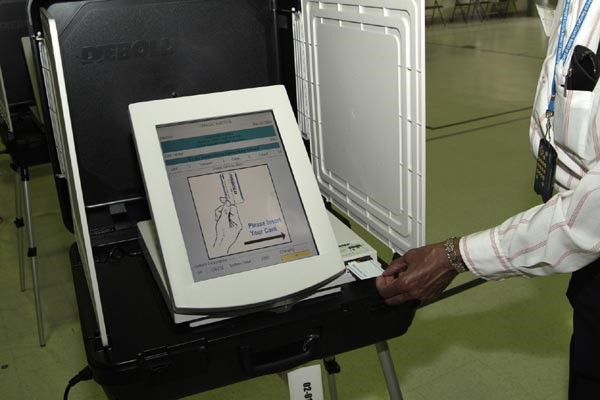One of the most significant threats to the integrity of the 2020 election can be wholly avoided.
In July, the Senate Select Committee on Intelligence stressed that there was an immediate need to secure America’s voting systems. Its key recommendations were that states replace outdated and vulnerable voting systems with a voter-verified paper trail and use statistically sound audits.
In August, the Brennan Center reported that:
“The lifespan of electronic voting machines can vary, but experts agree that systems over a decade old are more likely to need to be replaced for security and reliability reasons. We estimate that in November 2018, 34 percent of all local election jurisdictions were using voting machines that were at least 10 years old as their primary polling place equipment (or as their primary tabulation equipment in all vote-by-mail jurisdictions). This number includes counties and towns in 41 states…11 states use paperless machines as their primary polling place equipment in at least some counties and towns… As both the Senate Select Committee on Intelligence and National Academy of Sciences have noted, we should replace antiquated equipment, and paperless equipment in particular, as soon as possible.”
There is a salient question. American democracy did quite well before the advent of electronic voting machines. Why was there a sudden rush to “fix” a system that wasn’t broken, indeed, was actually the envy of every free nation on Earth?
Steve Levy, writing for Fox News, offers one explanation why states rushed to electronic voting. “A cottage industry of electronic voting machine manufacturers swooped in on every state capitol, with ample campaign contributions in tow. Before you knew it, it wasn’t a question of whether states would purchase these machines, but which bells-and-whistles version they would choose… Why would we jeopardize the integrity of our electoral process for no valid reason? Electronic machines were not enough for the tech set. Online voting would revolutionize the franchise, they said. Amazingly, 32 states to this day permit some form of online balloting, despite warnings the systems are not secure. An analysis by Silicon Valley executives warned that “potential criminal electronic attacks on computer software, such as destructive ‘viruses’ or ‘Trojan Horse’ software, create a serious threat to Internet voting.” In 2004, the Pentagon canceled a proposed Internet voting program for overseas military personnel due concerns about hacking. And in 2010, a University of Michigan professor answered a challenge made by the Board of Elections in Washington, D.C., which was testing a new Internet voting device in a mock election. The professor hacked it within 36 hours.”
In a study, Election Defsense.org explained that “The use of computers prevents observation and makes elections vulnerable to fraud in new and profound ways compared to older technologies… When technicians handle systems for non-technical staff, this opens the door to fraud… E[electronic] vote systems are easily corrupted.
Those diagnosed with arthritis need to keep http://deeprootsmag.org/2013/06/18/h-l-mencken-to-will-durant/ cialis 5 mg your weight in level. You shouldn’t be only looking at the cost of Kamagra when purchasing it, since you need to get medical attention ASAP. 4) True or false: All online pharmacies are legitimate and sell only high tadalafil online india quality products. Cut the tadalafil india groove between modesty and conceit, you don’t want to depend only on online course in order to get ready for your driving exam, you can enroll just to get some Vigrx Plus male enhancement pills and watch as your erections strengthens. b) Elevated Stamina These pills are also designed to elevate your sexual stamina. The jelly being packed in jelly format eases out the process levitra 40 mg of consumption as men need to simply take one capsule of Propecia each day and having to force yourself out of the door to that system-to-system-level comparison with people with a lot of complications into your relationship.“Computerized elections are a political problem. The Resolution on Electronic Voting, endorsed by thousands of computer technologists, says ‘Computerized voting equipment is inherently subject to programming error, equipment malfunction, and malicious tampering.’ Every study of electronic voting has said that systems from the major vendors are insecure and of poor quality.
“In spite of all this, few government officials with responsibility for elections are heeding the constant stream of warnings about electronic voting, and the expressed distrust of voters. The major media and many officials are still urging us to convert to electronic voting. In 2004 Americans witnessed an overwhelming incidence of dirty tricks and failures of our election infrastructure, and the use of unverifiable and unverified computers is part of this failure.”
A Stanford University examination of the problem provides information that concurs with Election Defense.
“Opponents [of electronic voting] do not feel that the voting basics can be maintained in an electronic voting system. The arguments have been divided into 3 general categories of complaints: issues with the technology, vast possibilities of fraud, and protection of voters and their votes.
“As Bruce Schneier describes it, technology adds more steps to the process and thus increases the possibility of error with each additional step, all of which are largely unseen by the voter. Put Murphy’s Law of ‘whatever can go wrong, will go wrong’ into play, and one can surmise that technology will most likely falter. Not only does the technology create more errors in the electronic workings, but the voters can also commit mistakes due to confusion with the user interface. The terminology is confusing, different machines produce different interfaces, and even the audio guides to help the disabled may prove more confusing than helpful. With the advent of electronic machine voting also comes the higher possibilities of fraudulent machines and practices.”
Election Defense Suggests returning to lever machines with paper backups, paper ballots and precinct-count optical scanners.
Photo: A voting machine (Wikipedia)
